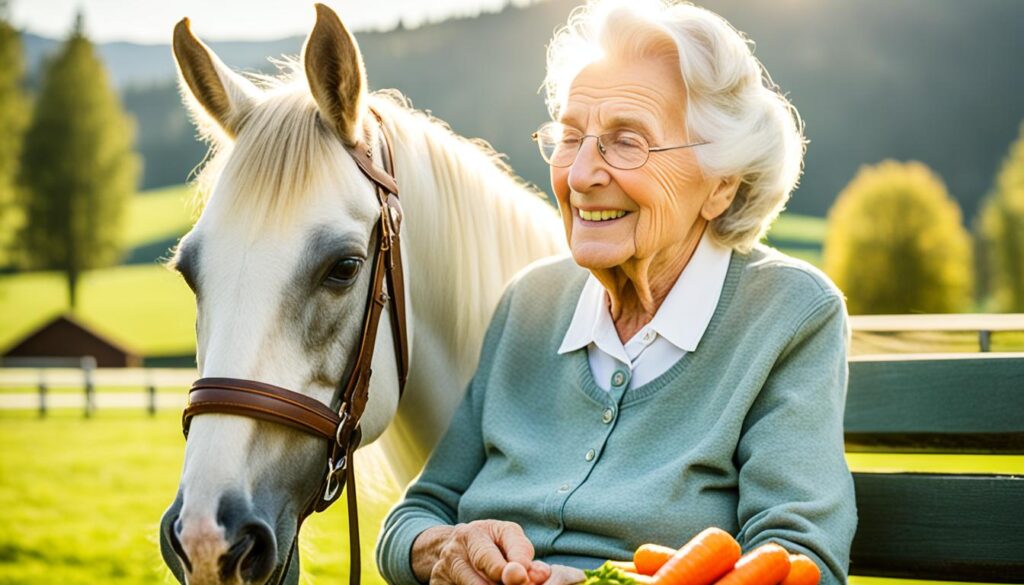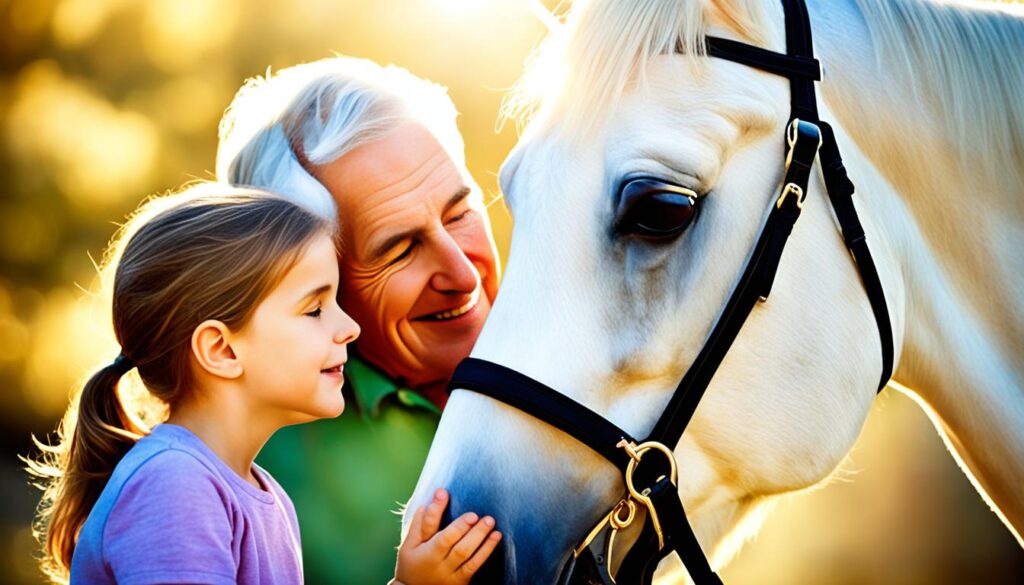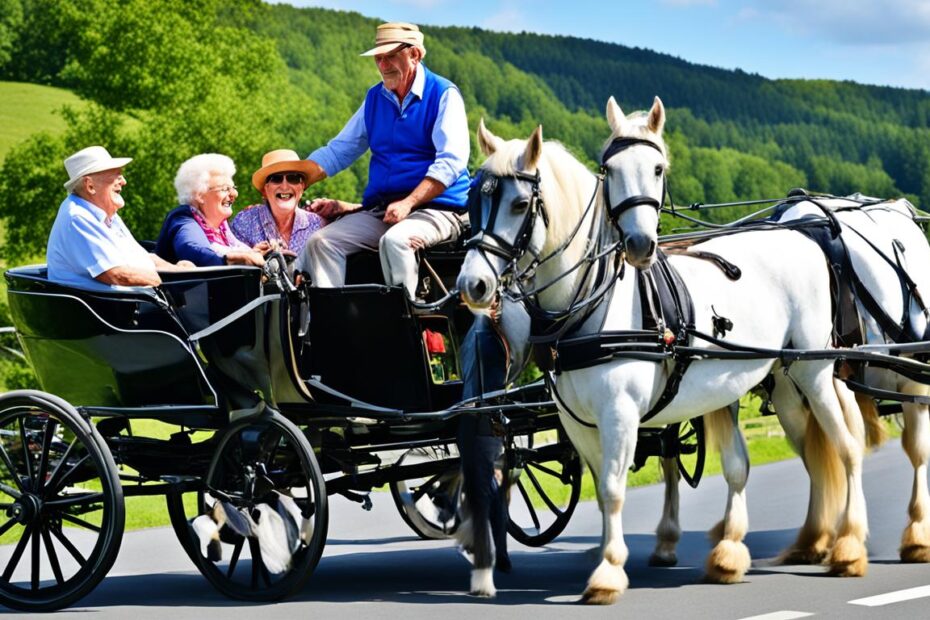In the ever-evolving landscape of senior care, a remarkable transformation is underway. Horse-driven initiatives are revolutionizing the way we engage and support the elderly population, offering a unique approach to promoting physical, mental, and social well-being.
These innovative programs harness the power of equine-assisted therapies and activities, redefining the aging experience and fostering meaningful connections.
Through the integration of horses in elderly care, these initiatives are breaking down barriers and creating a world of possibilities. From enhancing mobility and cognitive function to fostering intergenerational bonds, the presence of these majestic animals is transforming the lives of seniors in profound ways.
By leveraging the therapeutic benefits of equine interactions, these programs are empowering the elderly to regain their sense of independence, rediscover their passions, and cultivate a renewed zest for life.
As this article delves into the captivating world of horse-driven initiatives, readers will be inspired by the transformative impact these programs are having on the elderly population. From the enchanting world of equine therapy to the rejuvenating power of geriatric recreation programs, this exploration will uncover the multifaceted benefits that are redefining the aging experience.
Exploring the Benefits of Equine Therapy
Equine therapy, also known as equine-assisted therapy, is a powerful intervention that can significantly enhance the physical and mental well-being of the elderly.
By engaging with these gentle creatures, seniors can experience a range of benefits that go beyond traditional forms of therapy.
Enhancing Physical and Mental Well-being
Through therapeutic horseback riding, seniors can improve their mobility, balance, and muscle strength. The rhythmic movements of the horse, combined with the gentle exercise, can help alleviate joint pain and increase overall physical fitness.
Additionally, the calming presence of the horse and the sense of accomplishment from mastering new riding skills can have a profound impact on mental health, reducing stress, anxiety, and depression.
Fostering Intergenerational Connections
Equine-assisted activities often facilitate meaningful connections between the elderly and their younger family members or volunteers.
Participating in these shared experiences can foster a sense of camaraderie and understanding, bridging the generational gap and promoting strong intergenerational bonds.
The collaborative nature of caring for and interacting with the horses encourages teamwork, communication, and the creation of lasting memories.
The remarkable benefits of equine therapy make it a valuable tool in the arsenal of interventions for improving the overall well-being of the elderly.
By harnessing the power of these majestic animals, seniors can enhance their physical capabilities, boost their mental health, and forge meaningful intergenerational connections.
Horse-Driven Initiatives for Elderly Engagement
Horse-driven initiatives for elderly engagement are innovative programs that integrate horses into the lives of seniors, offering a diverse range of activities and therapeutic experiences.
These initiatives leverage the unique benefits of equine interaction to promote physical activity, social connection, and cognitive stimulation among the elderly population.
By providing opportunities to engage with horses, these programs are transforming the aging experience and enhancing the overall quality of life for participants.
From therapeutic horseback riding to grooming and stable management, the integration of horses into geriatric recreation programs has proven to be a valuable resource for promoting mental and physical well-being among the elderly.
These horse-driven initiatives often incorporate animal-assisted interventions, where the presence and interaction with horses are used to stimulate cognitive function, reduce anxiety, and foster intergenerational connections.
Seniors participating in these programs have reported improved mood, increased socialization, and a renewed sense of purpose.
Geriatric recreation programs involving horses also focus on enhancing mental health support, with activities designed to promote social interaction and combat isolation.
Through these engaging experiences, elderly participants can forge meaningful bonds with their equine partners, leading to a heightened sense of well-being and a more fulfilling aging journey.
By embracing the power of horse-driven initiatives, senior centers and community organizations are creating enriching opportunities for the elderly to stay active, engaged, and connected, ultimately improving their overall quality of life.
Senior Citizen Activities with Equine Partners
For senior citizens, engaging in activities that involve equine partners can be a truly rewarding and enriching experience.
One such activity is therapeutic horseback riding, where older adults can reap the physical and mental benefits of interacting with these majestic animals.
Therapeutic Horseback Riding
Therapeutic horseback riding offers seniors the opportunity to improve their balance, coordination, and muscle strength through gentle exercise. The rhythmic movement of the horse can also have a calming effect, reducing stress and anxiety.
Additionally, the act of riding and interacting with the horse can foster a sense of accomplishment and purpose, positively impacting the mental well-being of participants.
Grooming and Stable Management
Many geriatric recreation programs also incorporate grooming and stable management tasks, allowing senior citizens to actively care for the horses.
This hands-on involvement not only promotes physical activity but also cultivates a deeper bond between the participants and their equine partners.
Caring for the horses’ well-being can instill a sense of responsibility and purpose, contributing to the overall emotional and social engagement of the elderly.
These senior citizen activities with equine partners are valuable components of comprehensive geriatric recreation programs, fostering physical, mental, and social well-being among the elderly population.

Animal-Assisted Interventions for Cognitive Stimulation
In the realm of horse-driven initiatives for the elderly, animal-assisted interventions play a crucial role in promoting cognitive stimulation.
By engaging seniors in activities involving equine therapy, researchers have discovered remarkable benefits for improving memory, attention, and problem-solving skills.
These equine-assisted programs are designed to challenge the participants’ cognitive abilities through a variety of interactive tasks. Seniors may partake in memory-enhancing exercises, where they recall details about their interactions with the horses or associate specific equine-related information.
Additionally, sensory stimulation activities encourage participants to use their senses, such as touch and smell, to engage with the animals, ultimately supporting overall cognitive health and well-being.
The integration of animal-assisted interventions into geriatric recreation programs has proven to be a valuable approach in addressing the cognitive needs of the elderly.
By fostering connections with horses, seniors can experience a sense of purpose, reduced stress, and enhanced mental engagement – all of which contribute to improved cognitive function and overall quality of life.
- Animal-assisted interventions for cognitive stimulation
- Memory-enhancing exercises with horses
- Sensory stimulation activities in equine-assisted programs
- Cognitive health and well-being through equine interactions
Geriatric Recreation Programs Involving Horses
Geriatric recreation programs that incorporate horses are not only beneficial for physical and cognitive health but also play a crucial role in promoting social interaction and enhancing mental health support for the elderly.
By bringing seniors together in a shared activity, these programs foster meaningful connections, reduce feelings of isolation, and create a supportive environment.
The calming presence of horses and the sense of purpose gained through their care can have a positive impact on the mental well-being of participants, contributing to overall improved quality of life.
These programs offer a unique approach to geriatric recreation, blending the therapeutic benefits of animal-assisted interventions with engaging social activities.
Promoting Social Interaction
Geriatric recreation programs involving horses encourage social interaction among participants. Seniors can bond over their shared interest in caring for the animals, exchanging stories, and participating in group activities.
This fosters a sense of community and helps alleviate feelings of loneliness and social isolation, which are common challenges faced by the elderly.
Enhancing Mental Health Support
The interaction with horses has been shown to have a calming and soothing effect on the participants. The process of grooming, feeding, and interacting with the animals can provide a sense of purpose and accomplishment, which in turn boosts self-esteem and overall mental well-being.
These programs offer a holistic approach to geriatric care, addressing both the physical and emotional needs of the elderly.
Intergenerational Bonding through Equine Interactions
Horse-driven initiatives for elderly engagement often facilitate meaningful connections between generations.
By sharing the captivating experience of interacting with horses, seniors and their younger family members or volunteers can build stronger bonds, exchange valuable knowledge and stories, and create lasting memories.
These intergenerational equine interactions benefit the elderly in numerous ways. Not only do they provide opportunities for physical activity and mental stimulation, but they also foster a sense of community and understanding between the generations.
Younger participants gain a deeper appreciation for the wisdom and life experiences of the seniors, while the elderly find joy and purpose in passing on their knowledge.
Through activities such as therapeutic horseback riding, grooming, and stable management, the elderly and their younger counterparts can work together, fostering a collaborative spirit and a shared sense of accomplishment.
This shared experience can lead to the development of empathy, patience, and a greater respect for one another, ultimately enriching the lives of all involved.

Moreover, the presence of the gentle, calming animals can serve as a catalyst for meaningful conversations, allowing the participants to connect on a deeper level.
As they bond over their mutual fascination with the horses, the elderly and their younger companions can build lasting relationships, creating a lasting impact on their lives.
By integrating equine-assisted interventions into senior citizen activities, organizations can facilitate these valuable intergenerational connections, promoting the overall well-being and quality of life for the elderly population.
Cognitive Stimulation Techniques with Equine Therapy
Equine-assisted therapy programs for the elderly incorporate a range of cognitive stimulation techniques to support and enhance the mental well-being of participants.
These innovative approaches leverage the unique bond between humans and horses to stimulate the senses, improve memory, and challenge problem-solving skills.
Memory Enhancement Exercises
Seniors engaged in equine therapy often participate in memory enhancement exercises that encourage them to recall specific details about their interactions with the horses.
For instance, they may be asked to recount the sequence of steps involved in grooming a horse or to remember the colors and markings of the animal they worked with. These activities help strengthen cognitive function and boost confidence in the participants.
Sensory Stimulation Activities
Equine-assisted interventions also incorporate sensory stimulation activities that engage multiple senses. Participants may be encouraged to feel the texture of the horse’s coat, listen to the sounds of the animal’s movements, or observe the horse’s behavior and body language.
By immersing themselves in these multisensory experiences, the elderly can sharpen their perceptual skills and enhance their overall cognitive acuity.
By actively participating in these equine-based exercises, the elderly can experience a range of cognitive benefits that translate to improved overall function and quality of life.
The combination of cognitive stimulation techniques, equine therapy, memory enhancement exercises, and sensory stimulation activities provides a holistic approach to supporting the mental well-being of senior citizens.
Overcoming Barriers to Equine-Assisted Programs
While the benefits of animal-assisted interventions and geriatric recreation programs involving horses are well-documented, there can be challenges in accessing and implementing these transformative initiatives.
Cost, transportation, and accessibility are common barriers, particularly for senior citizens with limited mobility or financial resources. However, innovative solutions are emerging to ensure that all elderly individuals have the opportunity to experience the restorative power of equine-assisted activities.
One key strategy is fostering community partnerships. By collaborating with local organizations, senior centers, and healthcare providers, equine-assisted programs can secure funding, provide transportation assistance, and adapt their services to accommodate diverse needs.
This collaborative approach helps to break down the barriers that have historically prevented some seniors from participating in these life-enriching programs.
Additionally, equine-assisted programs are exploring creative financing options, such as grants, sponsorships, and crowdfunding campaigns, to make their services more accessible. By securing additional resources, these programs can offer sliding-scale fees or even free participation for elderly individuals with financial constraints, ensuring that cost is not a deterrent.
Finally, innovative adaptations to the programs themselves are helping to overcome physical accessibility challenges.
Modifications like wheelchair-friendly mounting blocks, sensory-stimulating ground activities, and personalized session plans ensure that seniors with limited mobility can still reap the benefits of interacting with horses and participating in equine-assisted therapies.
By addressing these barriers through collaborative solutions, strategic funding, and adaptive program design, equine-assisted initiatives are becoming increasingly accessible to the elderly population.
This, in turn, is unlocking the transformative power of these programs, fostering deeper connections, improving physical and mental well-being, and enriching the lives of senior citizens across the country.
Conclusion
In the end, horse-driven initiatives for elderly engagement have revolutionized the way we support and empower our senior citizens.
By integrating horses into a diverse range of activities and therapeutic programs, these innovative approaches are promoting physical, mental, and social well-being, fostering intergenerational connections, and enhancing the overall quality of life for the elderly.
As the benefits of equine-assisted interventions continue to be recognized, the future holds exciting possibilities for expanding access and ensuring that all seniors have the opportunity to experience the transformative power of these remarkable animals.
Senior citizen activities involving horses, along with animal-assisted interventions and geriatric recreation programs, have proven to be invaluable in promoting social interaction enhancement, mental health support, and cognitive stimulation techniques, such as therapeutic horseback riding.
Moving forward, the commitment to horse-driven initiatives for elderly engagement will continue to grow, empowering our senior population and fostering a more inclusive, supportive, and enriching society for all.
FAQ
What are horse-driven initiatives for elderly engagement?
Horse-driven initiatives for elderly engagement are innovative programs that integrate horses into the lives of seniors, offering a diverse range of activities and therapeutic experiences.
These initiatives leverage the unique benefits of equine interaction to promote physical activity, social connection, and cognitive stimulation among the elderly population.
How can equine therapy benefit the physical and mental well-being of the elderly?
Equine therapy, also known as equine-assisted therapy, can enhance the physical and mental well-being of the elderly in several ways. Engaging with horses can improve mobility, balance, and muscle strength through therapeutic horseback riding.
Additionally, the emotional connection and sense of calm fostered by interacting with these gentle animals can have a profound impact on mental health, reducing stress, anxiety, and depression.
How do horse-driven initiatives facilitate intergenerational connections?
Horse-driven initiatives for elderly engagement often facilitate intergenerational bonding, as younger family members or volunteers can participate alongside the seniors.
By sharing the experience of interacting with horses, the elderly and their younger counterparts can build stronger connections, exchange knowledge and stories, and create lasting memories.
These intergenerational interactions benefit both the seniors and the younger participants, fostering compassion and understanding between generations.
What types of senior citizen activities are involved in horse-driven initiatives?
Horse-driven initiatives for the elderly often include activities such as therapeutic horseback riding, where seniors can experience the physical and mental benefits of interacting with these majestic animals.
Additionally, programs may incorporate grooming and stable management tasks, allowing participants to actively care for the horses and develop a deeper bond.
How do animal-assisted interventions support cognitive stimulation for the elderly?
Horse-driven initiatives for the elderly also include animal-assisted interventions specifically designed for cognitive stimulation. By engaging with horses, seniors can participate in memory-enhancing exercises, sensory stimulation activities, and other interactive tasks that challenge their cognitive abilities.
These equine-assisted programs aim to improve memory, attention, and problem-solving skills, ultimately supporting the overall cognitive health and well-being of the elderly participants.
How do geriatric recreation programs involving horses promote social interaction and mental health support?
Geriatric recreation programs that incorporate horses are not only beneficial for physical and cognitive health but also play a crucial role in promoting social interaction and enhancing mental health support for the elderly.
By bringing seniors together in a shared activity, these programs foster meaningful connections, reduce feelings of isolation, and create a supportive environment.
Furthermore, the calming presence of horses and the sense of purpose gained through their care can have a positive impact on the mental well-being of participants, contributing to overall improved quality of life.
What are some cognitive stimulation techniques used in equine therapy for the elderly?
Equine-assisted therapy programs for the elderly incorporate a range of cognitive stimulation techniques to support and enhance the mental well-being of participants.
These include memory enhancement exercises, where seniors engage in activities that challenge their recall and problem-solving skills, as well as sensory stimulation activities that engage multiple senses through interactions with the horses.
By actively participating in these equine-based exercises, the elderly can experience cognitive benefits that translate to improved overall function and quality of life.
What are some of the barriers to accessing equine-assisted programs for the elderly?
While the benefits of horse-driven initiatives for elderly engagement are well-documented, there may be various barriers to accessing and implementing these programs. Factors such as cost, transportation, and accessibility can limit participation, particularly for seniors with limited mobility or financial resources.
However, innovative solutions, such as community partnerships, funding opportunities, and adaptations to accommodate diverse needs, are helping to overcome these challenges and ensure that all elderly individuals have the opportunity to experience the transformative power of equine-assisted activities.

